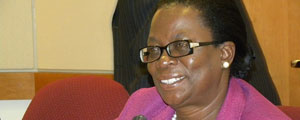
I have always been a champion of what is now called the ‘Women’s Movement’, being a woman! But, crucially, because I grew up in a household headed by two strong widowed women — my mother and my grandmother.
By Trudy Stephenson
The only male, my younger brother Frank, didn’t really have a look-in, gender-wise, although he was spoiled fairly rotten by grandma and mother.
I resented this bitterly, from an early age — jealousy, sibling rivalry, call it what you will, but my gender awareness and simmering activism date from that time long ago.
Being widows, both grandma and mother had to put on a brave face and somehow maintain their social status in a very conservative society. Grandma, a university professor’s widow, initially let rooms in our house to students. Then, being an excellent seamstress, she got a job at the only department store in town, making wedding gowns and doing general alterations.
My mother was a very different character! A young war widow (married at 17, widowed at 20), she refused the constant supplications of her father’s sister, my great aunt Mary, to finish her education and go to university (Aunt Mary offered to pay everything), saying that she knew all she needed to know, thank you, and she would manage just fine.
So she (we) survived on her widow’s pension, living in grandma’s house, and she got back into her social circles, eventually also becoming staff supervisor for a shop nearby.
She was a brilliant gardener and star member of the gardening club; she organized and participated in all sorts of events, especially the annual Easter Bonnet competition.
- Chamisa under fire over US$120K donation
- Mavhunga puts DeMbare into Chibuku quarterfinals
- Pension funds bet on Cabora Bassa oilfields
- Councils defy govt fire tender directive
Keep Reading
She presided over a sewing bee that moved from house to house, became Frank’s cub scout den mother, and soon became a member and ultimately president of our school parent-teacher association.
None of these were ‘masculine’ activities, but it taught me how resilient women are when need be, and that we can be independent and thrive.
Fast-forward to Zimbabwe 1988, when my first husband left me, and I also had to manage on my own, with 3 teenagers.
I adopted a strategy to get out of teaching (which was and remains too poorly paid to do more than simply survive) by taking night classes in typewriting and bookkeeping.
Strangely, in my view, a secretary earned more than twice as much as a degreed and long-experienced secondary school teacher, so this is what I decided to go for.
A year later I was delighted to be employed as a bi-lingual secretary-administrator by the French cultural and research centre at a decent salary, and I never looked back from then.
Advertisement
When the Forum for Democratic Reform Trust came up (see elsewhere) I joined, and was elected Deputy Secretary for Women at the Forum Party launch in 1994.
I therefore made it my business to get to know all the organisations involved in promoting and advancing women’s rights in Zimbabwe.
Thus it was that I was soon called to help in the Preparatory Committee for the Unite Nations Beijing Conference on Women’s Rights — Platform for Action 1995.
In a spirit of cross-party collaboration between women, I quickly accepted — and what an experience it turned out to be!
The meetings were naturally held in the boardroom of the Ministry of Women’s Affairs — which just happened to be housed in the Zanu PF Headquaters, otherwise known as Shake-Shake Building.
So I had to brave the security and general scrutiny and intimidation of someone clearly not their own to get into the place and get access to the boardroom.
That done, I found our chairperson, Minister Tenjiwe Lesabe, extremely welcoming and open, but rarely present, so the meetings were generally chaired by her deputy, Shuvai Mahofa.
Comrade Mahofa had a formidable reputation as a grass-roots politician prepared to get her hands dirty and literally fight tooth and nail — so I was afraid of her, at the beginning.
However, I soon found she enjoyed a good contest, even verbal, and that as women who had both suffered quite a lot, we actually had a lot in common! Indeed, we struck up a friendship that endures to this day, though we have not seen each other for several years.
Other top Zanu PF women joined the meetings now and again, which is how I met Oppah Muchinguri, Olivia Muchena, Joice Mujuru and Bridget Mugabe.
These were the ones who would eventually go to Beijing, of course! And the women Non-Governmental Organisation leaders, such as Thoko Matshe, Everjoice Win, Selina Mumbengegwi
and Joyce Kazembe were there to steer the whole process as best they could — and also make sure they were on board for the trip, as invaluable support.
Imagine my delight to be requested to write my input and submit it on floppy disk for inclusion in the country document — by Dr Muchena, I seem to recall.
In the end, mine was one of the few to be submitted, and the final Zimbabwe presentation included a lot of my work.
However, I got not one whiff of an acknowledgement, nor was I invited to Beijing, as I had foolishly imagined, until the very last minute, that I might be!
• Trudy Stevenson is Zimbabwe’s ambassador to Senegal











